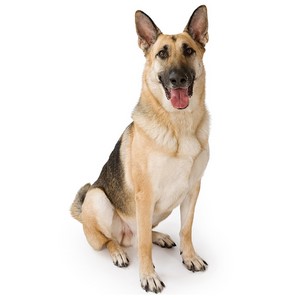German Shepherd Traits
Thinking to get a German Shepherd and want to know about the traits of a German Shepherd Dogs to help you decide if a German Shepherd is easy to adapt into your household.
German Shepherd scores  out of 5 in the scale of adaptability compared to other breeds.
out of 5 in the scale of adaptability compared to other breeds.
German Shepherd Personality
-
Hoping to bring a dog into your home? Some canine breeds are much easier to own than others, especially for beginner dog parents.
To find the easiest dog breeds to own, we took a look at an assortment of important attributes. And you might be amazed by the traits that matter most. For instance, you might think you want an intelligent dog. Highly intelligent dogs aren't always the simplest to train, because trainability is more about a dog's desire to comply with directions than his ability to recognize them.
You might think an energetic dog will be the simplest to keep healthy. A dog with a lower energy level and no genetic predisposition to disease will actually be easier to deal with. Plus, choosing a dog with an easygoing temperament - and minimal grooming needs - will go a very long way toward keeping you sane.
Ready to find the best dog? Check out 5 of the easiest dog breeds to own.
Top 5 Easiest Dog's To Own
2. Border Terrier - The border terrier is very "happy," "plucky," and "tender." This dog has a mild energy level but a more laid-back character than many other terriers.
3. Bulldog - If you want a patient and mellow dog, you can't make a mistake with the bulldog. You can efficiently train your bulldog - particularly if you use lots of praise and rewards and maintain a sense of humor.
4. Cavalier King Charles Spaniel - They can be loyal hiking partners or shameless couch potatoes, relying on the owner's character - as long as they get an enjoyable walk each day.
5. Basset Hound - These medium-sized dogs aren't very energetic. And while most dog owners won't put the basset hound's hunting prowess to the test, they'll treasure the breed's absolute patience with children.
What to do if you lose your German Shepherd
If your German Shepherd Dog or any other pet has gone missing and it does not have an identification tag with a phone number, you can:
1. Report your missing pet details at Pet Reunite website here.
2. List the missing pet on the Local Lost Pets Facebook Groups Here.
3. Visit the nearby vet clinics to see if someone has handed in your missing pet.
4. Call the RSPCA or Visit the RSPCA Lost Pets website and complete a Lost Pet Report.
5. Visit Lost Pets Pages of Animal Pounds.
What to do if you find a lost German Shepherd
If you find a German Shepherd Dog or any other pet and it does not have an identification tag with a phone number, you can:
1. Report the found pet details at Pet Reunite website here.
2. List the missing pet on the Local Facebook Lost Pets Groups.
3. Contact the Local Authority to collect the lost animal.
4. Take the animal to the local Animal Shelter assigned to your suburb.
5. Take the animal to the local Vet Clinic who can scan the animal’s microchip and locate the registered pet owner.
Laws Regarding Missing Pets
1. It is against the law to keep any animal that you find.
2. Pets are generally considered property and it is illegal to take and keep someone else’s property.
3. You must contact your local animal control unit and file a FOUND AN ANIMAL report for any dog or cat you find.
4. To reclaim your lost dog, cat or other pet from the animal shelter you must pay a release fee.
5. If your dog or cat is unregistered, you will have to register your pet before you can take it home.

